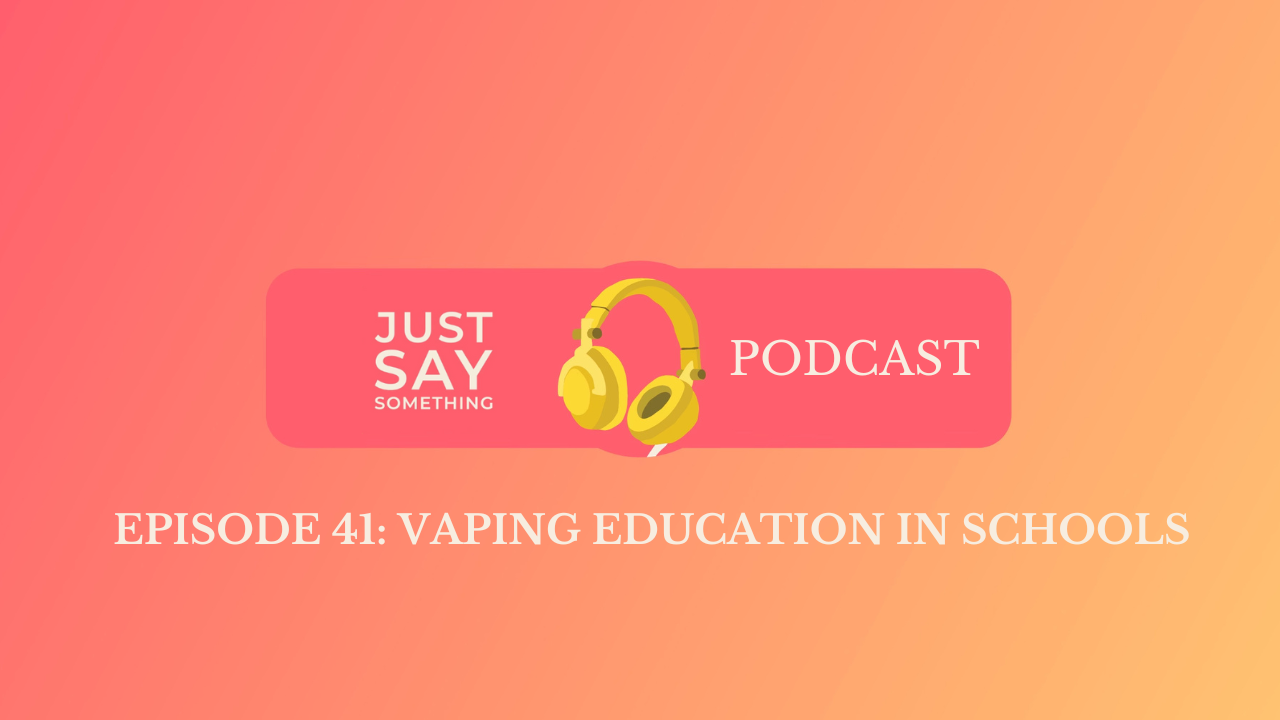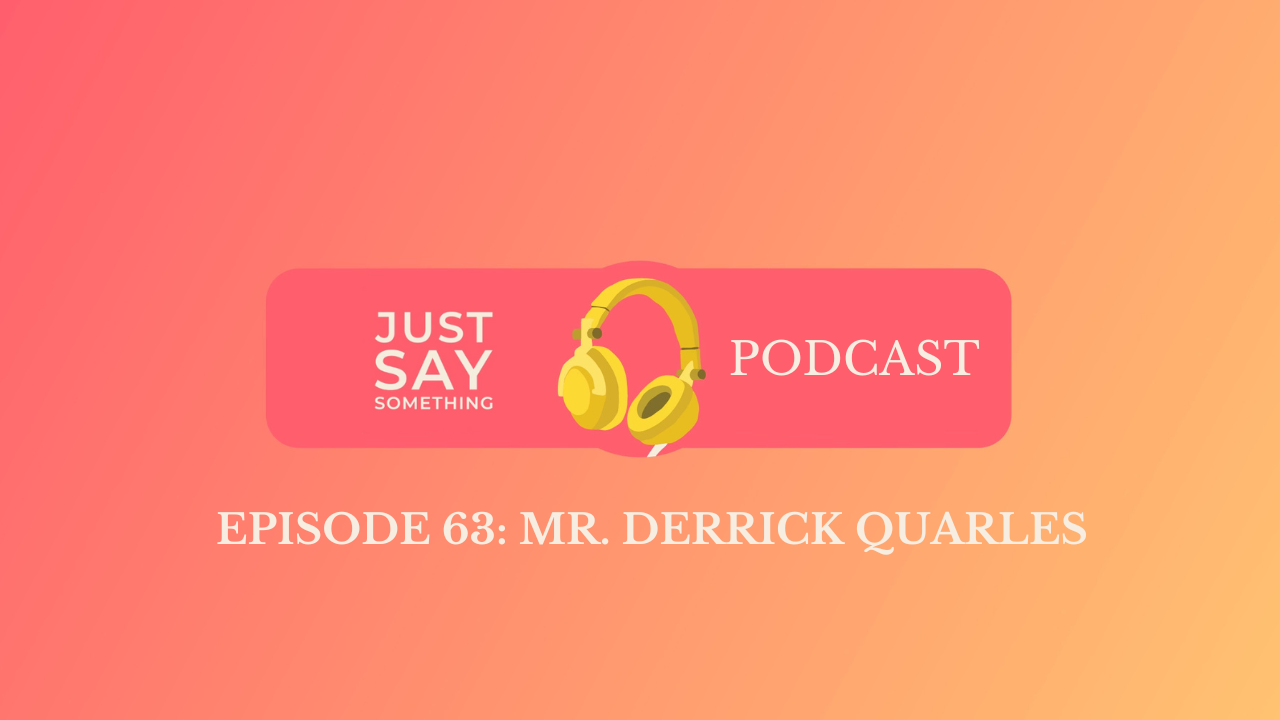[00:00:08] Speaker A: Well, good morning and welcome back to just say something's weekly podcast. My name is Phil Clark, and I'm the CEO executive director here at just say something. And we're happy you're with us this week.
You know, this is something new that we've tried this year, and hopefully you've been able to listen to our podcast. We're all over. We're on YouTube, we're on Spotify. All those things that I can't ever keep up with. We're on those. So be sure to check us out. And if you've missed a series, check it out. I'm really, really excited. Today we have a former board member, but not only a board member, he was one. He was our board president at one time. And so, Roy Davenport, welcome to just say something.
[00:01:05] Speaker B: Thank you, Phil. Glad to be here.
[00:01:07] Speaker A: So, tell us a little bit about your time on the board and what that was like for you and your family.
[00:01:20] Speaker B: Well, boy, I tell you, when I was on the board, it was truly very transitional period for the board. Not only did we move locations, but we.
We endured a name change, which was a challenge from Greenville family partnership that everybody would scratch their head and say, what is that about? To just say something.
But our mission stayed the same always. So even though it was a transitional period in those respects, the mission never changed. And that was to continue to inform and educate the public about the dangers of substance abuse and tobacco and alcohol and all of those things that we encounter every day in our lives.
[00:02:12] Speaker A: Yeah, it's one of those things that we all encounter, but people don't want to talk about it.
I know you have a personal story, if you wouldn't mind sharing that with our audience, and then we can do some follow up as what you tried to do as a result of what happened in your family.
[00:02:35] Speaker B: Well, my family endured what every parent's nightmare is, and that is we lost our youngest son to. To fentanyl. And at the time, I certainly had not heard of fentanyl. I had no idea what it was.
And I dare say my son probably didn't know a whole lot about it as well.
But we got that phone call on a Saturday night that they found my son at his place of work unresponsive.
By the time we got there, they said, well, there's nothing we could do. He's gone.
As a parent, you don't know what to do with grief.
That level of grief is just so overpowering that you find yourself experiencing every emotion you can imagine, from anger to sadness to depression.
All of those things sometimes at the same time. So we had to find a way to get through that grief. And I was fortunate enough that a friend of mine from many, many years ago was on the board at that time, and he. And just say something's passed. Executive director Carroll Reeves contacted me, wanted to meet for breakfast.
So they told me about just say something. At that time, it was Greenville family partnership, and they said, there's a way you can funnel that grief into something positive.
And the more I listened, the more I knew that this was something that I needed to do. And my daughter, who was going through the same thing at losing her brother, I thought, this is something we can do.
So we joined the board and again, took something was horrible, a tragedy, and we tried to turn it into something positive.
[00:04:45] Speaker A: Yeah.
You know, parents are. Their kids are supposed to outlive our parents. And so there's so many stories here in the community, right here in Greenville, that you're not unique, unfortunately. And so a lot of families are suffering, not knowing what to do with that grief. So what were some of the steps? What did you take on after that to try and deal with your grief?
[00:05:18] Speaker B: Well, one of the things that was shocking to us was how pervasive this issue is. Everybody that we would come in contact with either had been affected directly or indirectly or knew somebody that had been affected, and it was just overwhelming.
And I knew that a lot of those families, like we did, did not know how to channel that grief, what to do with that grief.
And it's important to grieve, but I think it's also important to talk through that grief.
So my daughter Heather and I started a grief support group, and it grew from just a couple families that would come in.
So I think the last time we had a group before we merged with another grief support group over at favorite, I think we had about 24 or 25 people representing 24 or 25 families that had been impacted.
So we got together as a group, and we allowed them, when they felt comfortable in talking about their grief, we would meet and let people talk. And it's incredibly healing to be able to talk through that and to realize that you're not going through it alone, that other people are experiencing the same thing. And that makes a huge difference. So we did that for, I think, about three or four years, and there was another support group at favor that was much larger and much more facilities at that time. So we merged the two groups. And as far as I know, that that support group still is active.
[00:07:13] Speaker A: Yeah.
And as far as I know, too, it's grown from what it was, because that's been several. That was what? Pre COVID.
[00:07:23] Speaker B: Yeah. Oh, yeah.
[00:07:24] Speaker A: And so.
So as a result of. Of your son death and his name was Scott?
[00:07:33] Speaker B: Yes.
[00:07:35] Speaker A: You went to Columbia.
[00:07:37] Speaker B: Yeah.
[00:07:40] Speaker A: It didn't end up the way you wanted it, but you never know.
[00:07:45] Speaker B: Well, one of the things that was surprising to my daughter and I were, and I began to read everything I could possibly read about this issue.
And one of the things I found out was that South Carolina was one of the few states in the southeast that did not have a law that held drug dealers accountable for someone's death.
Most of the states had laws that were like homicide by drug delivery, or even some cases murder by drug delivery.
In South Carolina at that time, the only thing that a drug dealer could be charged with was just selling the drugs.
So we introduced a bill to the state legislature that would hold drug dealers accountable when their activity resulted in someone's death.
I was absolutely shocked when I did a presentation before the legislature that one senator from the lower part of the state made the comment. He said, Mister Davenport, I don't think we need any more laws to deal with drug dealers.
And essentially, the way the legislature works, one person can table that motion or that bill and it never goes any further. And that's what happened.
[00:09:13] Speaker A: Wow.
Because I know you had support for that bill.
[00:09:17] Speaker B: We did.
[00:09:18] Speaker A: Especially from our upstate delegation.
[00:09:20] Speaker B: Yes.
[00:09:22] Speaker A: That's unfortunate, but we haven't given up. There you go. We haven't given up. And you never know when that may come back to Colombia.
Now, as a result of our state receiving opioid recovery fund, they are putting it out in local communities.
And so we're just starting to build a movement under our power collective to where we've joined with the sheriff's office and rise prevention. We're bringing in Clemson. We have Prisma, we have bon secours, unity health domain just in this immediate area that are going to start using our lockable prescription bottles that we have. And so it's something different. It's an opportunity for those in the community to keep their drugs at home, locked up.
Kids are getting them from kids who are getting them from their parents.
And so it's. There's just cause so much grief for our community and for our families.
[00:10:44] Speaker B: Probably most families don't realize the dangers of all these unused medications lying around the house. I know it was an eye opener for me because back when I was on the board, we had one of those drug take back days, and I went through our medicine cabinet and there must have been 25 or 30 bottles of unused, I mean, some very powerful things like hydrocodone and some other powerful pain medications that we never completely used. And, you know, just the thought of one of my grandchildren getting hold of that was scary.
[00:11:28] Speaker A: Right, right. And then, too, with the death of your son, then he had a daughter.
[00:11:36] Speaker B: He did.
[00:11:37] Speaker A: And so what was that like for, because you and Carolyn had already been mom and dad. And so tell us a little bit, if you don't mind, a little bit about Hannah, but also let's celebrate her victory of what she's doing now.
[00:11:55] Speaker B: Well, Hannah was twelve years old at the time of her father's death. And the hardest thing I've ever had to do was to let her know the next morning that her father had died.
And she went through a lot of counseling to deal with that.
It's hard for someone twelve years old to understand exactly what's happened.
Her mother had not been in her life since she was about two.
So Carolyn and I, my wife and I became the parents. And she grew into an amazing young woman. And she joined the navy and she's studying to be a corpsman.
[00:12:40] Speaker A: Wow.
[00:12:40] Speaker B: In fact, she's at the Great Lakes Naval Training center up above Chicago.
So on May 30, we get to go and watch her graduate. And we're so proud of her. She's an incredible young woman.
[00:12:55] Speaker A: And she's a beautiful young woman inside and out.
[00:12:59] Speaker B: She is. She's a beautiful young girl, young woman now. And she actually did some modeling. She's.
But more importantly, she's beautiful inside.
[00:13:12] Speaker A: Yeah, absolutely. Absolutely. And she gets that from her grandma and grandpa.
So you picked up a hobby?
I was going to say recently, but it hasn't been recently.
[00:13:26] Speaker B: Not really.
[00:13:29] Speaker A: So share with our audience a little bit about Roy Davenport and his hobby.
[00:13:37] Speaker B: Well, from the time I was probably beginning school, I loved to draw. And my parents house was always full of my little pen and ink drawings and scratches. And my plan originally was to be a commercial artist. And in fact, I had been accepted at ringling School of Art in Sarasota, Florida. But life kind of got in the way and my life, my career went in a different direction.
But I always kind of dabbled in art. And then when I sold my business in Chapaloo, North Carolina, and semi retired, I say semi because I don't ever consider myself completely retired.
I took up art much more seriously. And in fact, I probably paint at least a couple paintings a week now.
[00:14:34] Speaker A: Wow.
[00:14:35] Speaker B: And it's medicinal, especially during COVID Sure. I tell people that my art kept me sane during COVID because my wife's diabetic, and we were very isolated during COVID afraid to go out.
So I would get up at the crack of dawn and start painting, and I'd paint till dark just to have something to do.
And it's turned in more than just a hobby. My art now is on display at open art studios on Main Street.
[00:15:08] Speaker A: Nice.
[00:15:09] Speaker B: And also at Cafe west on Coffee street in downtown Greenville. I have a website where people can go and look at my art. It's Davenport fine art.
And I'm proud to say that I've made the decision to dedicate a percentage of my art sales to just say something as another way of giving back.
[00:15:35] Speaker A: Thank you, Rory. That means a lot to, to us in the organization, and we've been blessed having you and Heather on our board and to help support our mission.
We could probably sit here and talk for hours and hours and hours.
If you could give one piece of advice to a parent caregiver, because we can't say just a mom or a dad now about their advice about their kids, what would it be?
[00:16:15] Speaker B: Talk to your kids about the issues.
Just say something.
Because one of the things that we realized after the fact was that we didn't know what we didn't know.
So this has been an education for us. But you need to talk to your children, make them aware of what's going on, and make those lines of communication always open.
But just as your name implies, just say something.
[00:16:50] Speaker A: That's right. And if you don't know how to say something, if you don't know where to start, we can help you.
You can find us on the
[email protected]. Or you can give us a call at 864-467-4099 we've, research shows us, tells us that communication is one of the best. To start young with your children and to continue that as they grow older, to know their friends, to set rules and boundaries, they may, you may think they don't want that, but deep down, they do want that. And so there's so much that we have, and not that anybody's a bad parent, but like you just said, you didn't know what you didn't know. And so those of us in the working world, we get professional development to help us do our job better. There's help out there to help moms and dads and caregivers be better. Moms and dads and caregivers.
Well, Roy, I want to thank you for the time today. Hopefully we can do this again.
We appreciate you and everything that you're doing in the community and look forward to many more years of our relationship. And feel free to come by anytime.
[00:18:18] Speaker B: I will. Thank you, Phil, for helping me come by and share that today.
[00:18:21] Speaker A: Absolutely. Thank you.


